#PrivacyCamp20: Event Summary
The 8th edition of Privacy Camp revolved in 2020 around the topic of Technology and Activism, the schedule being composed of ten sessions in different formats. What were these about? Read below a summary of each discussion, with references to full session recordings.
The 8th edition of Privacy Camp revolved in 2020 around the topic of Technology and Activism, the schedule being composed of ten sessions in different formats. What were these about? Read below a summary of each discussion, with references to full session recordings.
Storytelling session: Stories of Activism
Session description / Session recording
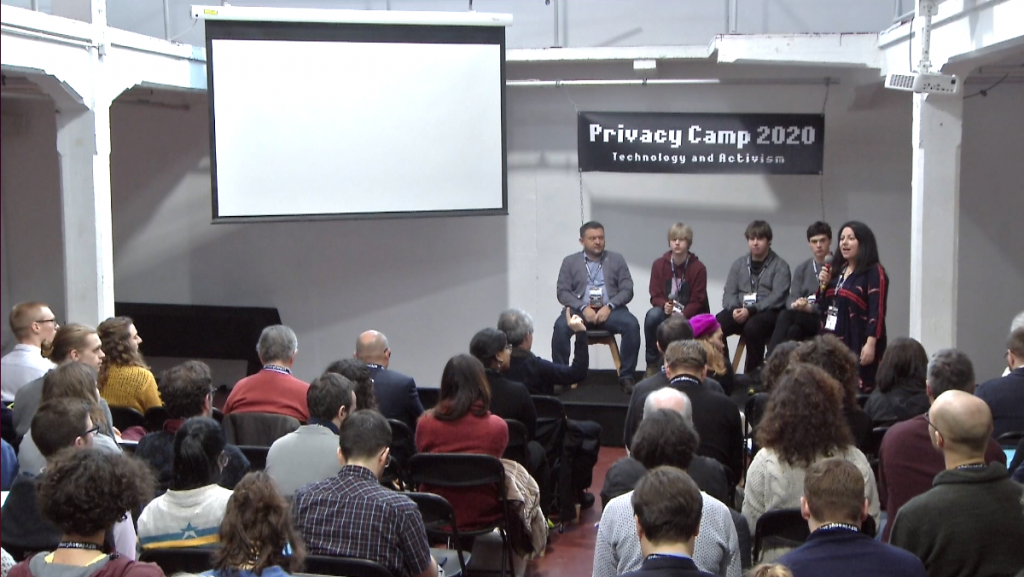
This session was under the format of a series of three stories from four activists. Jeff Deutch from The Syrian Archive opened the chat by pointing at the role of emerging tech in documenting conflicts, from the war in Vietnam to the rise of citizen journalism in the context of the Tunisian revolution in 2011 and the Syrian conflict. Due to platforms’ policies of content removal in this context, he pointed at three areas of work he’s currently invested in, as part of Syrian Internet Archive: archival, verification, and searching of content. Sergey Boyko from Internet Protection Society Russia continued the session by talking about his experience of using the internet while hiding from the law enforcement, who aimed to arrest him, with the goal of stopping a street protest against the Russian government’s pension reform that he was organising. He pointed at tactics to secure his communications, accommodation, and use of social media while in hide-out, and concluded it is possible to use the internet outside the governments’ eyes, if you understand how the internet works, and what the limitations of government surveillance capabilities are. Finally, Finn Sanders and Jan-Niklas Niebisch from Fridays for Future (FFF) Germany focused on the use of Social Media in FFF to attract people in protests with Instagram as instrumental in targeting young people. They outlined the tools used in national coordination, the cooperation with the police forces, as well as the moderation arrangements ensuring the content shared via these tools is legal and not harmful.
Defending digital civic space: How to counter digital threats against civil society
Session description / Session recording
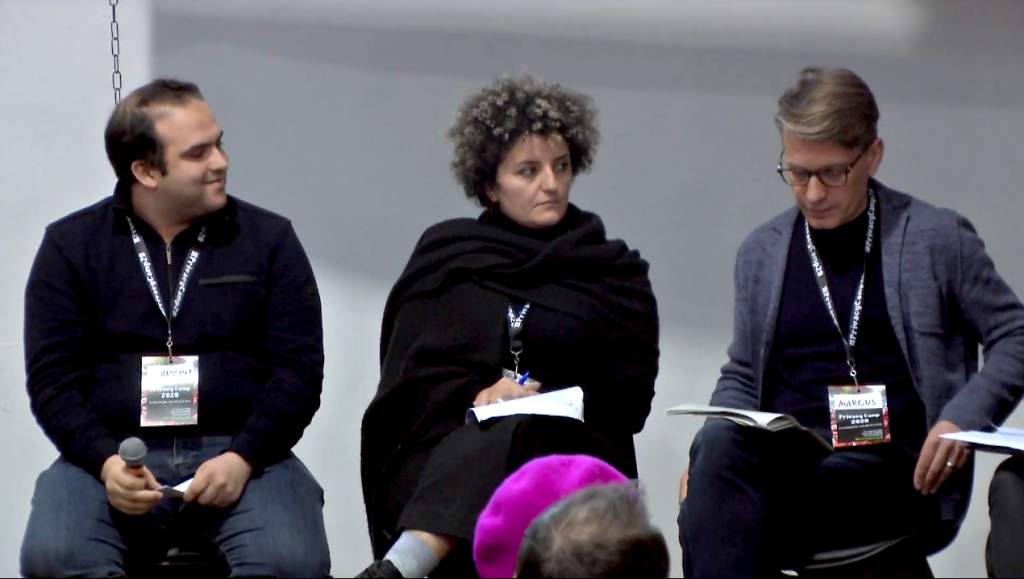
With a background in free software and free culture, journalist Rula Asad from Syrian Female Journalists Network kicked off the session mentioning how defending digital resilience is key to defending activists. She explained how her organisation does that in the case of internet shutdowns, spyware, or explaining activists how to use certain security tools. As someone advocating for human rights defenders (HRDs), with a focus on women, she helped building the security helpline in the IT security club in her University. Specifically, she mentioned the threat for men because of power relations and that for women speaking out is more difficult since they are more often silenced online than offline. Some of the risks she brought up are stress, burnout, and self-censorship because of lack of solidarity. Hassen Selmi from Access Now, on the other hand, mentioned phishing as a very common threat for HRDs, as well as physical attacks, arrests, search of devices, and ransomware. Finally, Alexandra Hache from Digital Defenders Partnership at Hivos mentioned the raise of mass surveillance and the crackdown on internet shutdowns and slow-down. She also pointed out at the raise of privacy friendly technologies, but also at the increased difficulty for users to control their data. More, she mentioned that activists are often using tools that are not designed for activists, such as social media. One of the key issues raised was the role of tailored training sessions for activists – with adequate follow-ups to ensure that good practices become part of the culture of the organisation.
Investigative journalism in South East Europe
Session description / Session recording
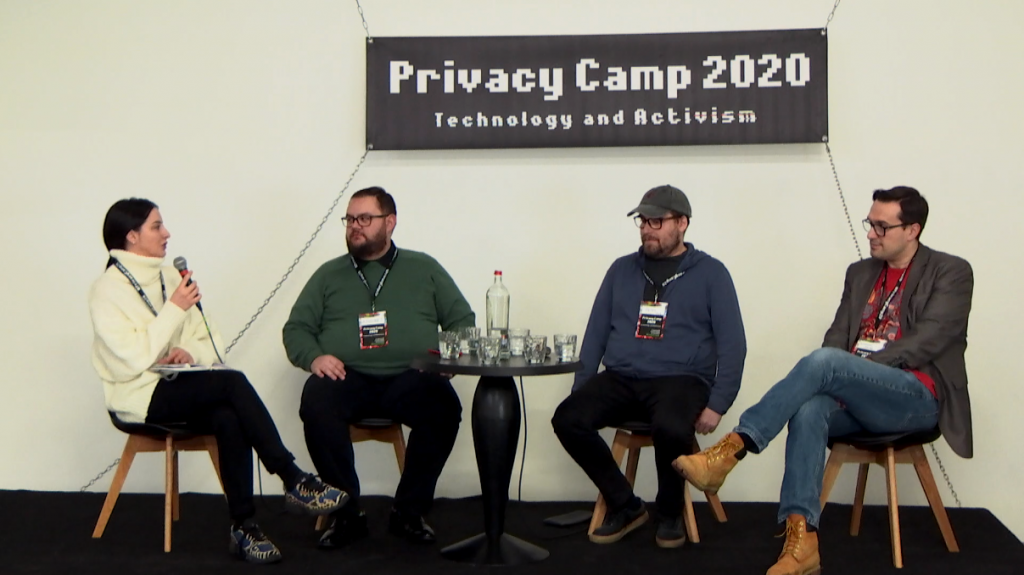
In this lively and insightful debate, moderator Sofija Todorovic from the Balkan Investigative Reporting Network (BIRN) led the panel through an exploration of how the context of state power, in particular the presence or absence of democratic controls, can change what it means to protect investigative journalists. Andrej Director of Tech at Share Foundation, launched the discussion with an explanation of how attacks on journalists are becoming less technical, and more focused on social engineering or smear campaigns. Drawing on the Serbian context, he noted that replacing the control of public actors with private actors shifts, but does not solve, the problem. Peter Erdelyi, Senior Editor at 444.hu, continued that civil spaces in Hungary are shrinking, with systematic government pressure on independent media to stop investigations into corruption. Domagoj Zovak, Editor and Anchor at Prime Time, finished by talking about the monopoly of media control in Croatia, and how it has led to a culture of fear. The conclusion of the panel offered a powerful reminder that increasing internet regulation is not a panacea, as in some parts of the EU, it is the state that poses the biggest threat to free expression, not private platforms.
How To Parltrack Workshop
Session description / Not recorded
The Parltrack workshop gave participants the opportunity to understand Parltrack and how to use it and its data more efficiently. The workshop started by a presentation of the European institutions and the legislative system and processes. Parltrack was presented as a European initiative to improve the transparency of the legislative processes. Although it is not a perfect tool (it can be hard to obtain data and to render amendments), participants were explained how Parltrack combines information on dossiers, representatives, vote results and committee agendas into a unique database and allows the tracking of dossiers using email and RSS.
The impact of surveillance on today’s kids – tomorrow’s human rights activists ?
Session description / Session recording
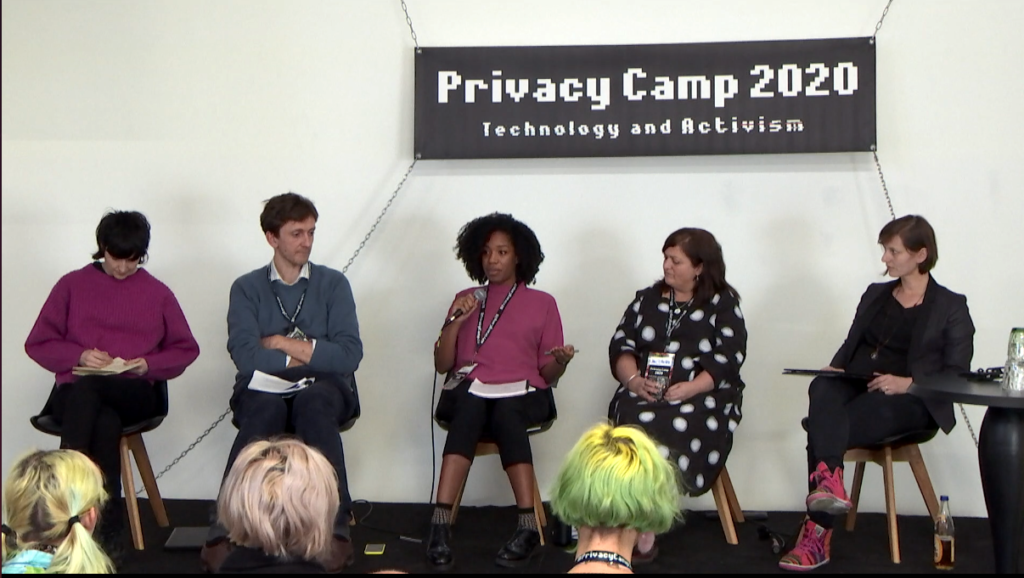
Jen Persson, Director of DefendDigitalMe, opened the discussion with the remark that children are perceived as an “Other” to be protected. It is under this protection regime that often, she argued, children loose their rights. She talked about schools monitoring pupils under their responsibility to identify extremist affiliations, as well as the commercial re-appropriation of school consensus data. Further, Daniel Carey from civil rights and judicial review law firm Deighton Pierce Glynn focused on his case on how a pupil took back control of their data after being referred under UK’s pre-crime Prevent programme. He rounded up how easy it is that data generated by children is used against that child. The third intervention was Liberty’s Policy and Campaigns Manager Gracie Bradley’s. She talked about the Against Borders for Children (ABC) coalition and the Boycott School Census action. She situated the topic within the UK’s “hostile environment policy”, under which the UK Government introduced entitlement checks into essential public services and data sharing schemes between those public services and the Home Office. Finally, Gloria Gonzales Fuster, Research Professor at Law, Science, Technology and Society (LSTS) Research Group at Vrije Universiteit Brussel (VUB), argued that anyone who cares about data protection and privacy in general cannot position children on a lower level of protection because of their age. She mentioned the existing preamble under the General Data Protection Regulation (GDPR) that children deserve specific protection, as well as the strategies often used to circumvent the legal protections for children and their data under current data protection legal frameworks.
EDPS – Civil society summit
Session description / Session recording
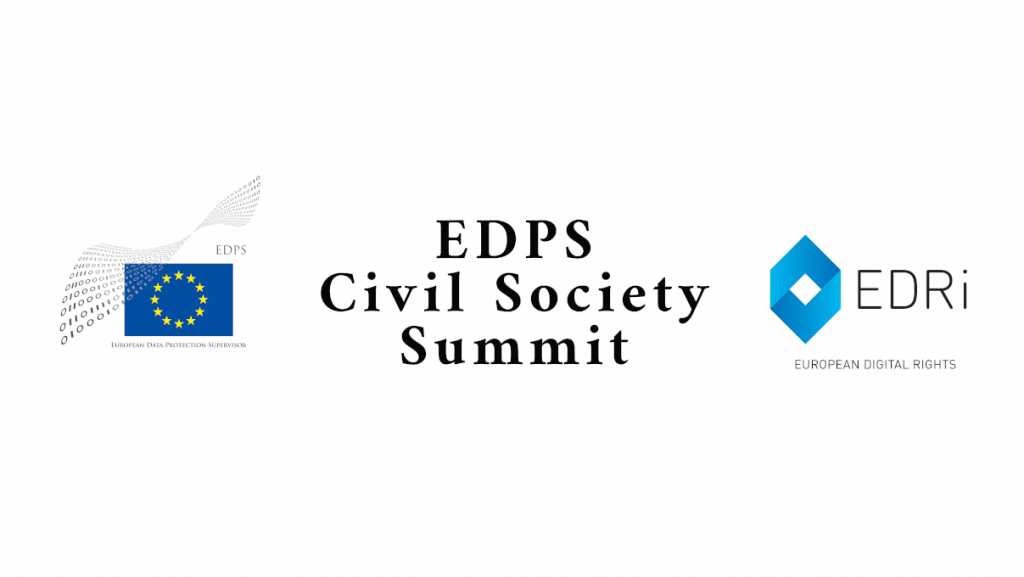
The Privacy Camp hosted the European Data Protection Supervisor (EDPS) civil society summit that gave participants the opportunity to debate the rising threat of facial recognition with the EDPS himself, Wojciech Wiewiórowski, and members of his team. From across the EDRi network and beyond, attendees gathered at the roundtable to talk about violations to the principles of proportionality and necessity, and other rights impacts. This included examples of the deployment of facial surveillance systems in France, Serbia and Wales. The summit allowed participants to debate the merits of a ban compared to the benefits of a moratoria, and also to consider whether civil society should focus on improving enforcement of existing legislation instead. It also gave everyone the chance to consider the nuances between different uses of facial recognition – for example whether it is in public spaces or not. The EDPS closed the roundtable with a nod to the old CCTV privacy/security debates, and a recognition that the current approach to facial recognition is very fractured across Member States. He warned civil society not to focus on the accuracy question, and instead to look at tools to address the fundamental rights risks, such as impact assessments.
Access requests as a tool for activism
Session description / Session recording
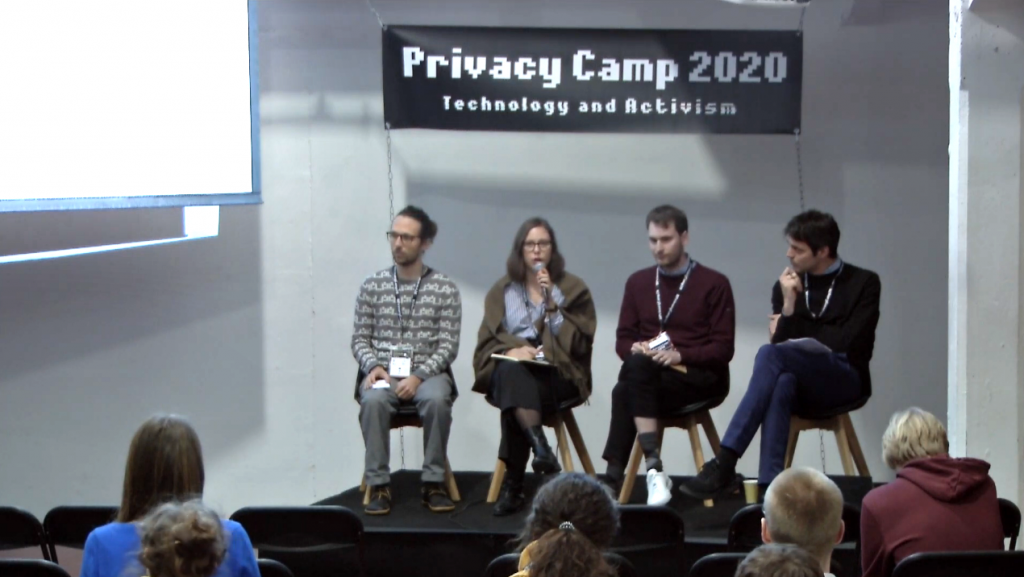
Following an explanation of the right of access under the General Data Protection Regulation (GDPR), the moderator Joris van Hoboken from the Law, Science, Technology and Society (LSTS) Research Group at Vrije Universiteit Brussel (VUB) introduced the first speaker Gaëtan Goldberg from noyb who presented their activities: representing individuals in front of their Data Protection Authorities (DPA). Noyb focuses on comparing the response people get when submitting a data access request to what the company say in its privacy policy and marketing material. Taking as an example the results from a series of subject access requests directed at streaming service providers such as Netflix and Spotify, Gaëtan concluded that data subject access requests are a good tool, but GDPR enforcement is much needed. Karolina Iwanska of Panoptykon Foundation explained that they approach the topic throughindustry, and the power and influence that governments and companies have over our decisions. She explained that the way Panoptykon uses data subject access request is through a focus on the interpretations of collected data in the areas of advertising and banking credit scoring. Finally, René Mahieu from LSTS presented the subject of his PhD around the questions of “Is the right of access effective in practice?”. Adding to the uses of the data requests by digital rights organisations, René mentioned the spread of data subject requets as a tool for labour rights and consumer rights organisations. More, he pointed out that access is not easily given, but as soon as public spotlight exists, companies are quick in replying to such requests.
“Actually, In Google We Trust”? A ‘Deconstructing’ Conversation on Russian Internet
Session description / Session recording
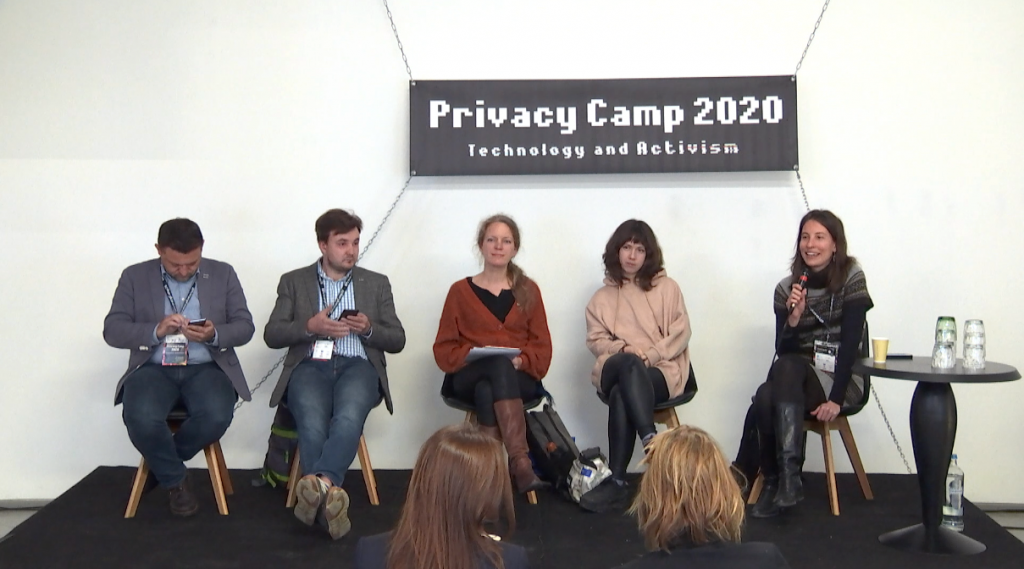
The moderator Francesca Musiani from Centre for Internet and Society (CNRS) started the debate by briefly describing the new set of juridical measures that impact internet infrastructures and therefore the civil liberties of Russian population. She also listed some new ways of circumventing those limits that might be surprising for Western activists. Ksenia Ermoshina from CNRS talked about her research on the use and development of encryption protocols in the region, and how cryptographic researchers were surprised that endangered journalists were using Facebook, Whatsapp and similar tools. He continued stressing that the perception of security vs privacy is very different than in Western Europe. Anna Zaytseva from LLA CREATIS of University of Toulouse-Jean Jaurès gave examples on why some activists use Google services. The main reason was that, according to the Google Transparency Report, Google never replied to information requests from Belarusian or Russian authorities. She stressed that, due of geopolitics, if you want be an activist in the United States, you should use the Russian social network VK, whereas if you are an activist in Russia, you should use Facebook. Sergey Boyko, co-founder of the Internet Protection Society, highlighted that aspect: hundreds of VK users have been jailed for their opinions or posts, as there have been only two cases of people jailed for their posts in Facebook. In that sense, Facebook is relatively safe for Russian activists. Services like email.ru and VK give the info to SPB (Saint Petersburg Police) directly in real time. Boyko also mentioned that Russian authorities cannot use the Chinese way – they couldn’t simply ban Facebook and Google. They use other methods: they intimidate those companies with high fines, with menaces of blocking, and they work very closely with them, to get the sensitive contents removed. Activists are afraid that eventually Google and Facebook will start to collaborate much closer with Russian government. That’s why it’s important for the activists to work with those big platforms to make them understand the dangers of collaborating with Russian government.
Activism and digital infrastructures
Session description / Session recording
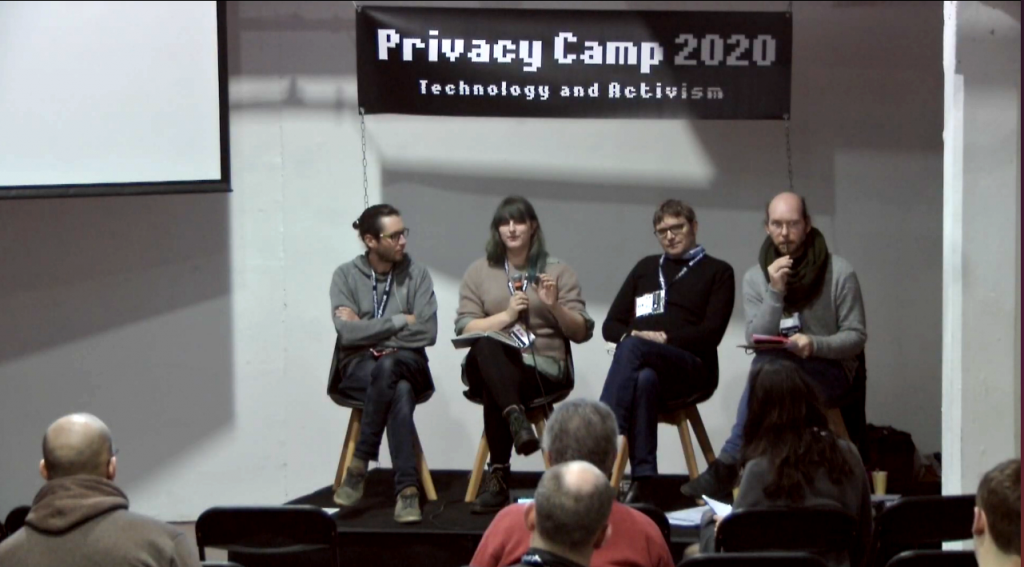
The discussion was started by Amber Macintyre from Tactical Tech, who pointed that the rise in data-driven tools in the NGO sector informs, but does not determine long-term decision making. Michael Hulet from Extinction Rebellion Belgium mentioned that, despite being aware of the dangers of exploitative data flows in activist circles, privacy-friendly tools can slow-down a grassroots movement. Tools used must, according to him, be accessible and global. Further, Glyn Thomas, Digital Strategy Consultant working with NGOs, shared his thoughts on the privacy-related behaviour of organisations of different sizes, by also focusing on what are the dangers in this respect for each type of an NGO. Moderator Jan Tobias Muehlberg facilitated the Q&A, addressing issues such as trust, platform censorship of activists, use habit and ways to transit to alternatives, among others. The discussion concluded with the idea that activists need to have concrete visibility of threats coming from the lack of privacy in order to be motivated to change their tools and practices.
Internet for All – Silenced and Harassed No More!
Session description / Session recording
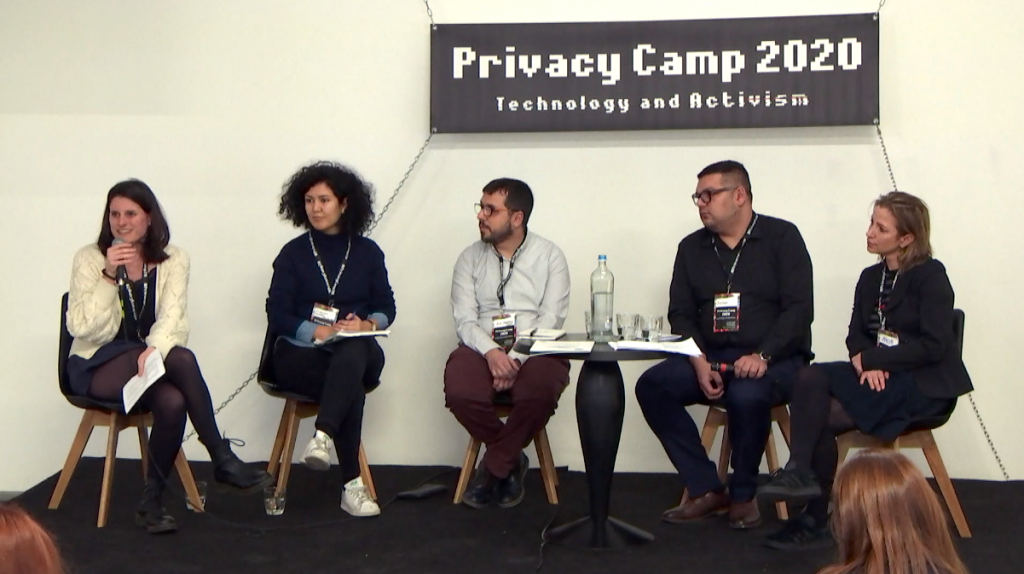
This powerful panel drew attention to the need for digital rights work to better incorporate diverse, intersectional experiences in order to protect all internet users. EDRi’s Chloe Berthélémy, as moderator, noted that this is important for upcoming work on the Digital Services Act (DSA). Oumayma Hammadi from Rainbow House Brussels launched the panel by raising the issue of the disproportionate censoring of LGBTQ+ online spaces and bodies. Alejandro Moledo from European Disability Forum (EDF) continued that platforms are an important part of self-determination for people with disabilities, but they receive enormous online abuse. Štefan Balog from Romea revealed how the internet has exacerbated hatred of Roma people and has been responsible for even inciting physical violence. Lastly, Pamela Morinière from the International Federation of Journalists talked about how our gendered society affects women journalists, leading to hate and violence both on- and offline. She explained that online anonymity protects abusers from accountability.
What was your favourite session this year? Let us know by tweeting your thoughts with the hashtag #PrivacyCamp20.
Privacy Camp Updates Newsletter
https://mailman.edri.org/mailman/listinfo/privacycamp
Privacy Camp Event website
https://privacycamp.eu
#PrivacyCamp2020 – Programme
https://privacycamp.eu/?p=1126
